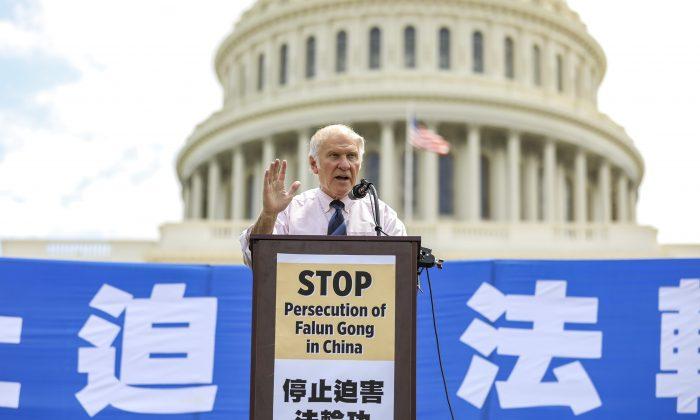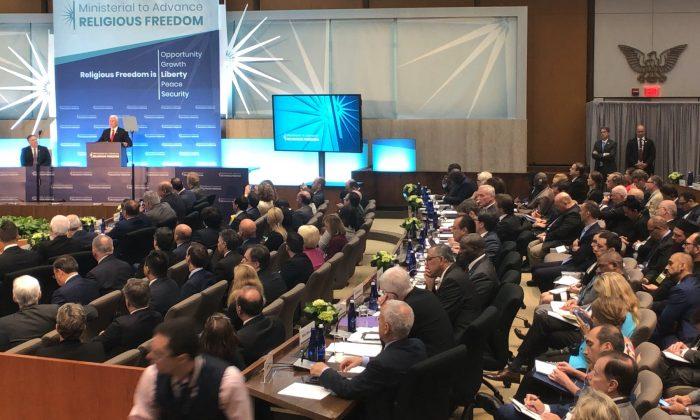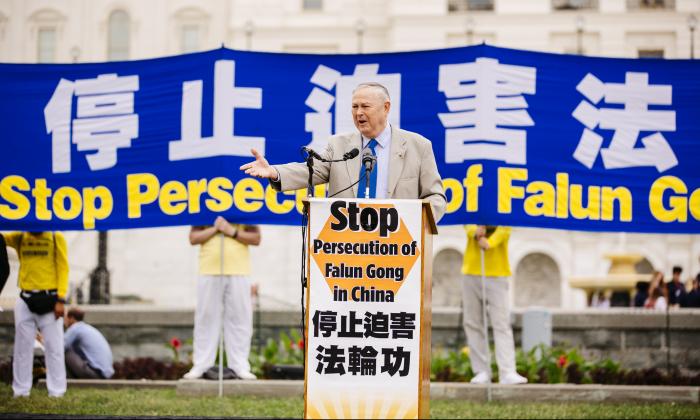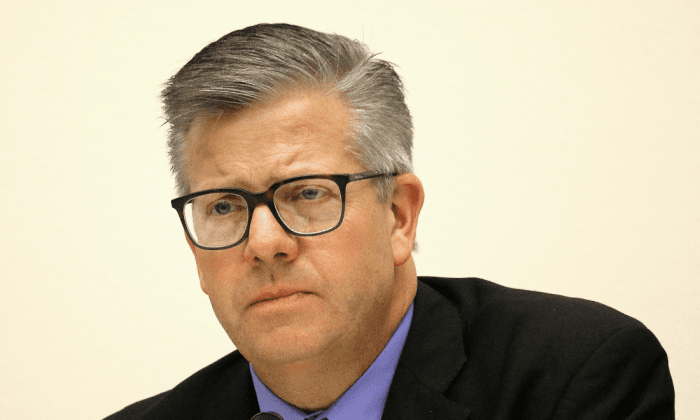WASHINGTON—In recent months, hope for legal reform in China has eroded as the lawyers and rights defenders have been increasingly detained, physically abused, subjected to surveillance and control, and “disappeared.” One chilling effect of the numerous disappearances is that whenever the normally outspoken lawyers resurface, they are, with few exceptions, unwilling to speak to media concerning their treatment when they were held incommunicado.
Legal reform in China may now be dead, according to some experts who monitor closely China’s legal profession and justice system.
To discuss the current conditions for human rights defenders and lawyers in China, and implications for U.S. policy, the Congressional-Executive Commission on China (CECC) held a roundtable discussion on June 23. The CECC was created by Congress in October 2000 with the mandate to monitor human rights and the development of the rule of law in China, and to submit an annual report to the President and the Congress.
CECC invited two U.S. attorneys, who support Chinese lawyers and legal reform, and two human rights activists to discuss their understanding regarding this latest crackdown.
China rights defenders are accustomed to state harassment. In the run-up to the Olympic Games and on sensitive historical dates such as June 4 (the date of the Tiananmen Square massacre), activists would be confined to their homes, brought in for questioning, and barred from leaving the country.
But conditions usually went back to normal after the special time passed, said Elisabeth Wickeri, from the Leitner Center for International Law and Justice, Fordham Law School. Ms. Weickeri is a member of the Committee to Support Lawyers, an independent NGO based at the Leitner Center, which seeks to strengthen the role of lawyers in China.
“Since February of this year, the situation has deteriorated significantly, in particular for human rights lawyers who have … taken on the most unpopular criminal defense cases,” said Wickeri.
The deterioration can be seen in two ways, according to Wickeri. The crackdown has led to at least 20 detentions and disappearances and many more placed under surveillance. Secondly,
“There is an eerie silence among lawyers and other defenders who would previously have remained vocal and outspoken… Even casual meetings over lunch or coffee have become difficult to arrange, because of the fear of associating with others working in this field, especially, of course, with foreigners.”
Her point was corroborated at the roundtable by attorney Margaret K. Lewis, Associate Professor of Law, Seton Hall Law School, who said, “When I was in China last month, I was struck by a decrease in the level of candid conversations at various meetings on legal reforms as compared with even last year.”
Enforced ‘Disappearance’
The CECC maintains an active database of political prisoners and other persons of conscience being held in communist China. Back in May, the Commission focused on 20 individuals who are lawyers, rights advocates, petitioners or bloggers, and who have been reported missing or “disappeared.” (“Rights advocates” is a term used in China for those who lack a license to practice law but have been self-taught and assist people with grievances.)
Six on the list are prominent human rights lawyers—Teng Biao, Tang Jitian, Jiang Tianyong, Li Tiantian , Liu Shihui, and Tang Jingling—who were detained in late February to early March 2011. The enforced disappearances of these six and others appear to be related to the protests in the Middle East and North Africa as well as to an anonymous online call in February for Jasmine Revolution protests within China.
The first four attorneys above have been released, but remain under police surveillance or “soft detention” (ruanjin), according to China Human Rights Defenders (CHRD).
For example, Jiang Tianyong, 40, a Beijing-based human rights lawyer, “disappeared” between Feb.16 and April 19. On the afternoon of Feb. 19, Jiang was seized from his brother’s home and driven away, by men believed to be Beijing police. Jiang’s license to practice law was revoked in 2009 as punishment for his activism. Since his release, he is under “soft detention.”
Li Tiantian, 45, a human rights lawyer with the Shanghai Peixin Kenuo Law Firm, was disappeared between Feb. 19 and May 24. Li was held in a windowless room for the duration of the time she was disappeared except when she was interrogated.
Police interrogated Li about reposting messages related to the “Jasmine Revolution.” She was told that if she did not cooperate, police would beat her with batons and lock her up in an “iron cage.” Li currently is not really free either but is also under “soft detention.”
The most prominent person among the dozens of human rights lawyers, activists, writers and bloggers recently detained is artist and rights advocate Ai Weiwei, who was released June 22, after being held for 81 days. Ai said that he is not allowed to talk and is confined to Beijing for one year. He “confessed” to tax evasion, but observers assume he was charged because he is an outspoken critic of the communist regime.
Ai’s exposing of government corruption and producing a video of people reading the names of the children who died in the Sichuan earthquake, and circulating it online, “make him a bigger threat than a mere tax evader,” said Lewis.
“Not a lawyer, but an advocate for change, it is worrying that [Ai Weiwei] was detained for so long without information about his condition,” Wickeri said.
In addition to recent cases, the CECC would like accounting of long-standing cases—the disappearance of human rights lawyer Gao Zhisheng, and the police surveillance and “soft detention” of blind legal advocate Chen Guangcheng and his family, and of legal scholar Fan Yafeng.
The term “soft detention” is often misleading. Chen became world renowned for exposing the illegal forced sterilizations and abortions in a rural province. After serving his sentence of four years and three months, he and his family have been confined to their home.
According to Chen’s wife, both of them were beaten for two hours. Police broke their TV antennae, and plundered their home, taking their computers, “video camera, audio tape recorder, all of our chargers, and even flashlights.” She said they sealed the windows with sheets of metal and robbed them of all their books, her husband’s blind cane and DVD player and their child’s toys. Surveillance cameras have been strategically placed to monitor the house 24-hours, making it impossible to leave.
China Legal Reform Future Bleak
According to the four witnesses, it’s hard to be optimistic about legal reform in China. Lewis is concerned that the regime “fundamentally views lawyers as undermining stability rather than enhancing it.”
Sarah Cook, Asia Research Analyst, Freedom House, stated that the recent series of abductions cannot be viewed in isolation. She sees the Chinese Communist Party leadership behind the increased suppression. The rights lawyers who had been tolerated up until now are on the receiving end of the “full force of a pre-existing extralegal repressive apparatus to silence them,” and, unfortunately, there is no independent judiciary system to appeal to.
Li Xiaorong, formerly with the Institute for Philosophy & Public Policy, University of Maryland, said not to put much faith in the US-China Human Rights Dialogues. “The dialogues seem to be more to appease critics of complacency than to secure real change,” she said.
Wickeri saw hope in the foreign media’s attention on the problem and in independent lawyers outside of China speaking up for their Chinese colleagues. In this regard she cited the work of Professor Jerome Cohen, senior adviser to the Committee to Support Chinese Lawyers. Bar Associations, including the New York City Bar, have already spoken up, she said.



